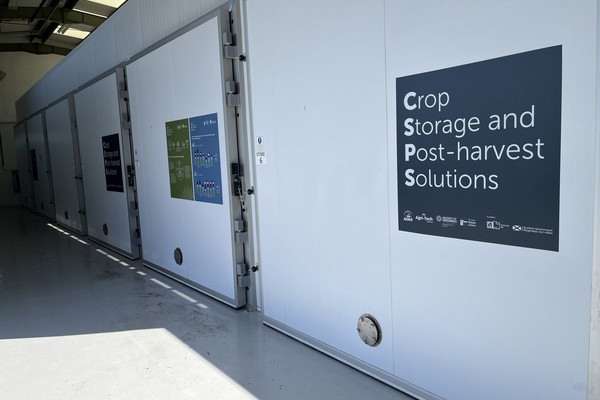The Crop Storage and Post-harvest Solutions (CSPS) facility, which is funded by the Scottish and UK Governments, formally opened its doors in May. The team based at the facility will explore the impact of elements such as temperature, gas composition and humidity on the quality, nutritional value and appearance of stored crops.
Currently, 5-20% of initial crop productions are lost due to insufficient or poor storage, especially in developing countries. The facility leverages world leading plant and data sciences along with advanced technological and digital innovations to explore methods for prolonging the shelf life of produce by inducing a 'near-sleep state' post-harvest to preserve its inherent qualities and manage disease.
 The new Crop Storage and Post Harvest Solutions (CSPS) facility at the James Hutton Institute.
The new Crop Storage and Post Harvest Solutions (CSPS) facility at the James Hutton Institute.
Professor Derek Stewart, Director of the Advanced Plant Growth Centre which operates the CSPS, highlighted the urgency of the facility's research objectives: "Time is not on our side. We have a growing global population that needs to be fed, and multi-billion pounds food and drink sectors which are based entirely around having access to a sufficient supply of good quality crops. Climate change, which is affecting growing seasons, is impacting crop yields and quality, and leading to food shortages is showing no signs of abating. Furthermore, any changes to agricultural practices have a direct impact on a crop's performance post-harvest, and so the widespread interest in regenerative agriculture will come with a need for allied post-harvest storage research."

The CSPS facility includes six, four tonne capacity chambers, allowing crops to be developed with improved storage and supply chain characteristics as well as being resilient in the field.
"Crop storage has to be a critical part of ensuring a sustainable supply of crops, and we need to get better at it and reduce waste. With the variety of scientific tools, we have at our disposable at the Hutton, we are able to address very specific concerns in highly controlled conditions. Our findings are more reliable, faster and relevant compared to more traditional store-and-pray approach".
The crop storage facility is delivered in partnership with the UK Agri-Tech Centre and is part of a network of crop storage facilities involving ADAS and the Natural Resources Institute (NRI) at the University of Greenwich.
For more information:
Sharon Simpson
The James Hutton Institute
Tel.: +44 07857 528757
www.hutton.ac.uk
